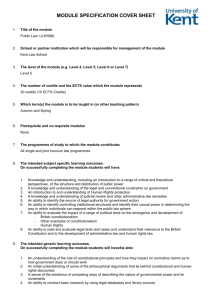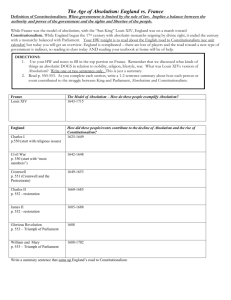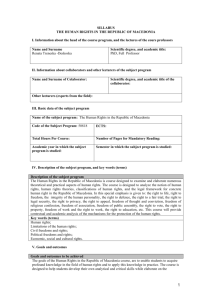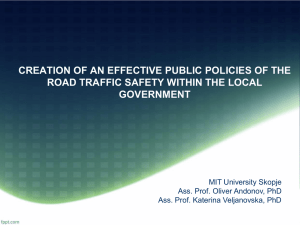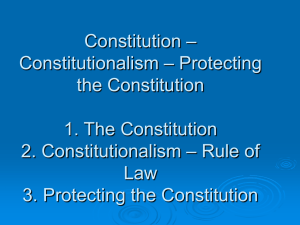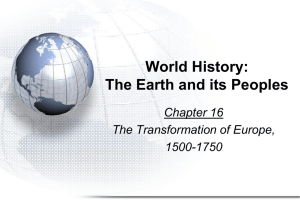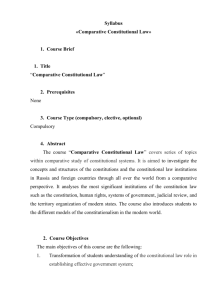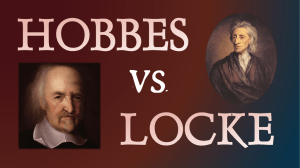CONSTITUTIONALISM SILLABUS I. Information about the head of
advertisement
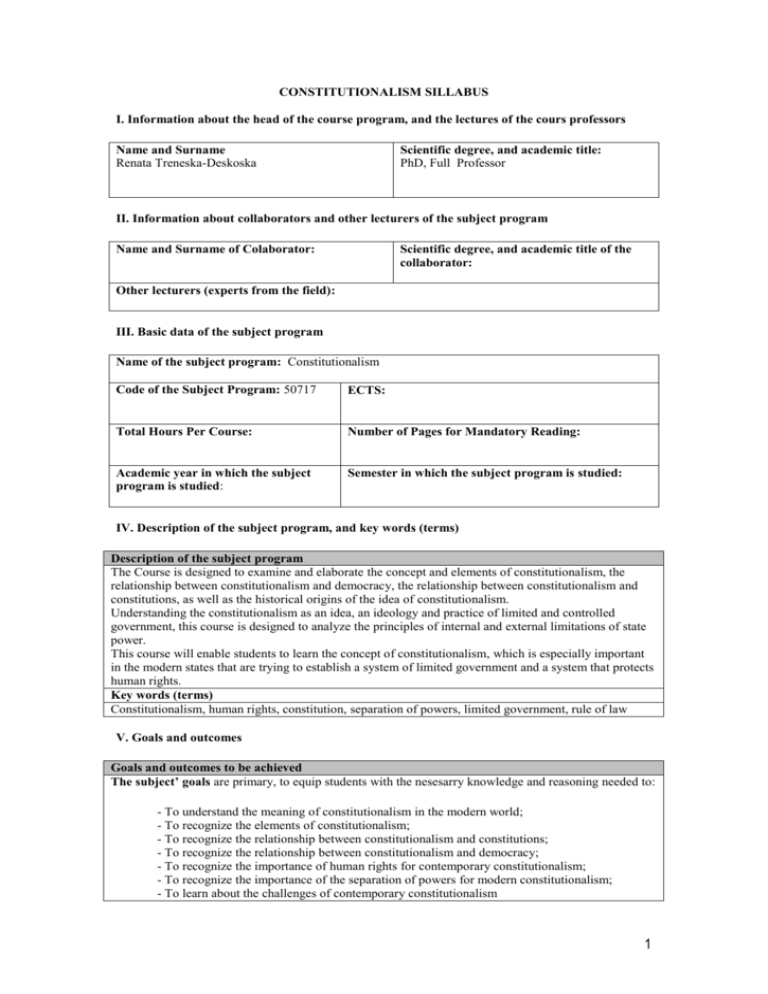
CONSTITUTIONALISM SILLABUS I. Information about the head of the course program, and the lectures of the cours professors Name and Surname Renata Treneska-Deskoska Scientific degree, and academic title: PhD, Full Professor II. Information about collaborators and other lecturers of the subject program Name and Surname of Colaborator: Scientific degree, and academic title of the collaborator: Other lecturers (experts from the field): III. Basic data of the subject program Name of the subject program: Constitutionalism Code of the Subject Program: 50717 ECTS: Total Hours Per Course: Number of Pages for Mandatory Reading: Academic year in which the subject program is studied: Semester in which the subject program is studied: IV. Description of the subject program, and key words (terms) Description of the subject program The Course is designed to examine and elaborate the concept and elements of constitutionalism, the relationship between constitutionalism and democracy, the relationship between constitutionalism and constitutions, as well as the historical origins of the idea of constitutionalism. Understanding the constitutionalism as an idea, an ideology and practice of limited and controlled government, this course is designed to analyze the principles of internal and external limitations of state power. This course will enable students to learn the concept of constitutionalism, which is especially important in the modern states that are trying to establish a system of limited government and a system that protects human rights. Key words (terms) Constitutionalism, human rights, constitution, separation of powers, limited government, rule of law V. Goals and outcomes Goals and outcomes to be achieved The subject’ goals are primary, to equip students with the nesesarry knowledge and reasoning needed to: - To understand the meaning of constitutionalism in the modern world; - To recognize the elements of constitutionalism; - To recognize the relationship between constitutionalism and constitutions; - To recognize the relationship between constitutionalism and democracy; - To recognize the importance of human rights for contemporary constitutionalism; - To recognize the importance of the separation of powers for modern constitutionalism; - To learn about the challenges of contemporary constitutionalism 1 - To analyze and evaluate the existence of constitutionalism in the Republic of Macedonia VI. Teaching methodology Teaching methodology The course will be taught through analysis of the legal documents and specific cases of protection of the human rights. The course is designed to use the comparative method, case study method and others. Classes will include participation of the students in analyzing cases and debate on certain topics and issues. VII. Detail Curriculum Structure Week 1 Number of Classes: Political studies 3,5 Topic: Mandatory literature: The basic theoretical questions on the notion of the constitutionalism Detailed structure of the thematic unit: The notion of constitutionalism, elements of constitutionalism, historical development Week 2 Number of Classes: Political studies 3,5 topic: Mandatory literature: The relationship between constitutionalism and constitutions Detailed structure of the thematic unit: The relationship between constitutionalism and constitutions, whether constitutionalism is conditio sine qua non for the existence of the written constitutions, what is the constitution, the importance of having the highest , supreme legal rules and provisions for creating constitutionalism Week 3 Number of Classes: Political studies 3,5 topic: Mandatory literature: Constitutionalism and human rights Detailed structure of the thematic unit: The notion of human rights as element of the constitutionalism, different comprehensions (concepts) of human rights and historical evaluation of human rights Week 4 Number of Classes: Political studies 3,5 topic: Mandatory literature: The basic questions of human rights, Civil freedoms and rights Detailed structure of the thematic unit: On the notion and term ,,human rights”, theories of human rights, history of the idea of human rights, classification of the human rights, civil freedom and rights Week 5 Number of Classes: Political studies 3,5 topic: Mandatory literature: The Human Rights in the Republic of Macedonia, political freedoms and rights Detailed structure of the thematic unit: This thematic unit will study political rights in the Republic of Macedonia in terms of their legal 2 regulation, as well as from the aspect of their implementation. Week 6 Number of Classes: Political studies 3,5 topic: Mandatory literature: Economic, social and cultural rights Detailed structure of the thematic unit: This thematic unit will study economic, social and cultural rights in the Republic of Macedonia in terms of their legal regulation, as well as from the aspect of their implementation. Week 7 Number of Classes: Political studies 3,5 topic: Mandatory literature: The status and rights of the minorities Detailed structure of the thematic unit: The status and rights of the minorities (notion of the minority, The Constitution of Republic of Macedonia and the position of the communities that are not majority in the Republic of Macedonia, Committee for relation between minorities, non-discrimination and equality of the national minorities Week 8 Number of Classes: Political studies 3,5 topic: Mandatory literature: Organization of the state powers, Assembly of the Republic of Macedonia Detailed structure of the thematic unit: The notion of the organization of state powers, parliamentary system, presidential system, mixed system, assembly system ( notion and genesis, forms, characteristics of political systems), Notion, origin, composition, mandate and constituting the parliament, the structure of the Assembly, internal organization, position of the representatives, parliamentary session, competences and acts of the Assembly Week 9 Number of Classes: Political studies 3,5 topic: Mandatory literature: The President of the Republic of Macedonia Detailed structure of the thematic unit: The notion of executive power, the notion and position of the chief of the state, competences, election and responsibility of the President of the Republic of Macedonia, Security council of the Republic of Macedonia Week 10 Number of Classes: Political studies 3,5 topic: Mandatory literature: The Government of the Republic of Macedonia Detailed structure of the thematic unit: The notion and types of governments, the position and composition of the Government of the Republic of Macedonia, , competences, election and responsibility of the Government of the Republic of Macedonia, relations between the President and the Government of the Republic of Macedonia. Week 11 Number of Classes: Political studies 3,5 topic: Protection of the human rights Detailed structure of the thematic unit: Mandatory literature: Week 12 This thematic unit will study the authorities responsible for the protection of human rights, the courts, public prosecutors office, Ombudsman. Number of Classes: Political studies 3,5 3 topic: Mandatory literature: Constitutionalism and the Constitutional Court Detailed structure of the thematic unit: Constitutionality and legality, Constitutional Court, theoretical foundations for protection of the constitutionality and legality, evolution of the judicial protection of the constitutionality and legality, importance and types of protection, preventive and repressive control of the constitutionality and legality, abstract and concrete control, position and composition of the constitutional court, functions, procedure of the court, legal effects of the decisions. VIII. Activities of external institutions Activities of external institutions IX. Literature Mandatory Literature Textbook in print Additional Literature 1. Рената Тренеска-Дескоска, „Конституционализмот и човековите права“, Скопје, 2006 2. Саво Климовски, Рената Дескоска и Тања Каракамишева-Јовановска, „Уставно право и политички систем“, Скопје, 2012 3. Светомир Шкариќ и Гордана Силјановска-Давкова, „Уставно право“, Скопје, 2011 4. Lidija Basta, ‘Politika u granicama prava”, Beograd, 2012 5. U. Preuss, “The Political Meaning of Constitutionalism”, in: R. Bellamy (ed.), Democracy and Sovereignty: American and European Perspectives (Aldershot: Avebury, 1996) 6. D. Kommers and W. Thompson, “Fundamentals in the Liberal Constitutional Tradition”, in: J. J. Hesse and N. Johnson (eds.), Constitutional Policy and Change in Europe (Oxford: Oxford University Press, 1995) 7. D. Kommers and W. Thompson, “Fundamentals in the Liberal Constitutional Tradition”, in: J. J. Hesse and N. Johnson (eds.), Constitutional Policy and Change in Europe (Oxford: Oxford University Press, 1995) 8. T. Grey, “Constitutionalism: an Analytic Framework”, in: J. Peenock and J. Chapman (eds.), Constitutionalism, Nomos XX (New York: New York University Press, 1979) 9. G. Sartori, “Constitutionalism: A Preliminary discussion”, The American Political Science Review, Vol. 56, No. 4, 1962 10. A. Sajo, Limiting Government. An Introduction to Constitutionalism, Chapter I (Budapest: CEU Press, 1999) 11. K. Friedrich, Constitutional Government and Democracy (Waltham: Blaisdel, 1968) 12. C. Fabre, “Constitutionalizing Social Rights”, The Journal of Political Philosophy, Vol. 6, No. 3, 1998 13. M. Vile, Constitutionalism and the Separation of Powers, Chapters I, II, XII, XIII (Indianopolis: Liberty Fund, 1998/1967) 14. J. Habermas, “Constitutional Democracy, A Paradoxical Union of Contradictory Principles?”, Political Theory, Vol. 29, No. 6, 2001 4
